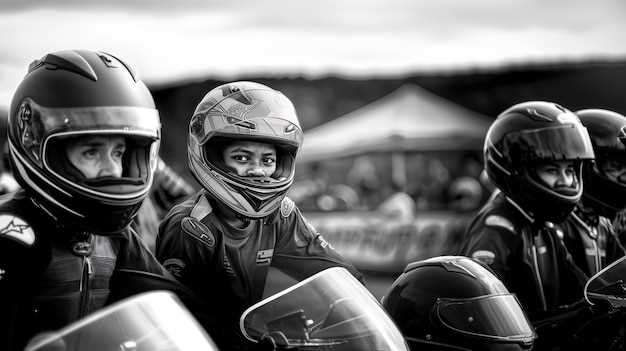The History of Volkswagen Motorsport

The history of Volkswagen in motorsport is a fascinating journey that spans decades, showcasing the brand’s commitment to excellence and innovation in racing. From humble beginnings to becoming a formidable force on the world stage, VW’s evolution in motorsport reflects not only the advancements in automotive technology but also the passion of countless enthusiasts and engineers.
Initially, Volkswagen’s foray into racing was marked by grassroots efforts that highlighted the durability and performance of its iconic models, such as the Beetle. As the years progressed, VW began to integrate its engineering prowess with competitive racing strategies, leading to notable successes in various motorsport disciplines. This shift laid the groundwork for Volkswagen to emerge as a key player in both circuit racing and off-road competitions.
Today, the legacy of VW in motorsport is further enhanced by its involvement in prestigious events, including the World Rally Championship and GT racing. Each chapter of Volkswagen’s history in racing not only showcases their sporting achievements but also underscores their relentless pursuit of innovation and performance on the track.
Key Milestones in Volkswagen Racing History

The history of VW in the world of racing is marked by numerous key milestones that highlight the brand’s commitment to motorsport. One of the earliest significant events occurred in 1953, when Volkswagen introduced the VW Beetle to rally racing, establishing itself in the motorsport community.
In the 1960s, Volkswagen strengthened its presence with the successful production of the Type 2, which became popular in rallies and off-road events. This decade solidified VW’s reputation for producing durable vehicles that could withstand rigorous racing conditions.
The dawn of the 1970s brought the iconic VW Golf GTI, which not only revolutionized the hot hatch segment but also became a dominant force in various racing series. Its lightweight design and agile handling allowed it to excel in motorsport competitions around the world.
The 1980s were a defining era for Volkswagen Motorsport with the introduction of the Golf I GTI in Group A racing. The car’s competitive edge in the FIA European Rally Championship showcased Volkswagen’s engineering prowess and strategic innovation in racing.
In 2001, Volkswagen made a significant impact by launching the Volkswagen Racing Team, marking a new chapter in their racing endeavors. This initiative focused on professional motorsport, participating in several championships and enhancing the brand’s visibility in the racing community.
The move into electric racing in 2018 marked another groundbreaking milestone. The Volkswagen ID. R broke records at Pikes Peak and the Nürburgring, showcasing VW’s dedication to cutting-edge technology and sustainability in motorsports, paving the way for the future of racing.
In recent years, the Volkswagen Motorsport division has continued to push boundaries, focusing on developing vehicles that combine performance with environmental responsibility while remaining competitive in various motorsport disciplines.
Technical Innovations Driven by VW Motorsport
Throughout its history, Volkswagen (VW) has continuously pushed the boundaries of automotive technology through its involvement in motorsport. This commitment to racing has driven a series of technical innovations that not only enhanced performance on the track but also influenced production vehicles.
One of the earliest significant contributions came from the legendary Volkswagen Beetle, which showcased the potential of air-cooled engine technology. This design was later adapted for racing purposes, where the vehicle showcased remarkable reliability and efficiency.
In the 1970s, VW made waves in rallying with the introduction of the VW Golf GTI, which featured a lightweight body and a potent fuel-injected engine. The integration of these technologies marked a pivotal point in the evolution of hot hatchbacks, setting standards that competitors would follow.
During the 1980s, Volkswagen’s commitment to motorsport was epitomized by the creation of the Golf II GTI and its successful campaigns in the Group A rally scene. Innovations such as all-wheel drive and turbocharging were developed, setting the groundwork for modern performance vehicles.
More recently, the introduction of the VW Polo R WRC further exemplifies the brand’s dedication to technological advancement. The incorporation of advanced aerodynamics and the use of lightweight materials contributed to its dominance in World Rally Championship events.
Additionally, VW’s foray into electric motorsport with the I.D. R signifies its forward-thinking approach. The I.D. R set records at iconic races like Pikes Peak, showcasing the capabilities of electric propulsion, advanced battery management systems, and cutting-edge aerodynamic design. This innovation signals a commitment to sustainable racing while continuing VW’s rich motorsport heritage.
In summary, the evolution of VW motorsport has been characterized by a series of technical innovations that have transformed the automotive landscape. Each development not only served to enhance competition on the racetrack but also translated into more efficient and powerful vehicles for everyday consumers, illustrating the profound impact of motorsport on VW’s history.
Impact of Volkswagen on Global Motorsport Culture

Volkswagen (VW) has played a pivotal role in shaping global motorsport culture. With a rich history in racing, the brand has made significant contributions to various racing disciplines, influencing both the competitive landscape and automotive enthusiasts worldwide.
Volkswagen’s foray into motorsport began in the late 1940s, with the iconic Beetle dominating hill climbs and racing events. This early engagement established VW as a formidable force in the automotive world. The introduction of the Volkswagen Golf GTI in the 1970s solidified VW’s reputation in the performance sector, leading to a surge in popularity for hot hatchbacks and setting standards that competitors would strive to meet.
In the 1980s, VW made headlines in rallying thanks to the legendary Volkswagen Golf G60, which paved the way for more advanced technologies in motorsport. The brand’s commitment to innovation continued with the Volkswagen Polo R WRC, which dominated the World Rally Championship, further enhancing VW’s image as a leader in racing.
Moreover, VW’s investment in electric racing has positioned the brand as a pioneer in sustainable motorsport. The participation in events like the Formula E demonstrates VW’s commitment to merging cutting-edge technology with competitive racing. This shift toward electric vehicles not only reflects current automotive trends but also influences the motorsport culture by promoting environmental responsibility.
Additionally, Volkswagen’s impact extends beyond the racetrack. The company’s engagement in grassroots motorsport initiatives has encouraged a new generation of enthusiasts. Programs like the VW Driver Search have opened doors for aspiring racers, demonstrating VW’s dedication to fostering talent within the community.
Through its innovative designs, successful racing programs, and commitment to sustainability, Volkswagen has left an indelible mark on global motorsport culture. The brand’s legacy continues to inspire both fans and competitors, proving that VW is not just a car manufacturer but a significant player in the evolving narrative of racing.



